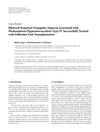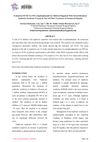 32 citations,
January 2012 in “International Journal of Dermatology”
32 citations,
January 2012 in “International Journal of Dermatology” Skin side effects from EGFR inhibitor cancer treatment can be managed effectively, often without stopping the medication.
 April 2024 in “Frontiers in medicine”
April 2024 in “Frontiers in medicine” Alopecia Areata significantly lowers quality of life and current treatments are inadequate, highlighting a need for better therapies and standardized treatment protocols.
 November 2023 in “Materials Today Bio”
November 2023 in “Materials Today Bio” Light therapy might help treat hereditary hair loss by improving hair follicle growth in lab cultures.
 January 2017 in “Springer eBooks”
January 2017 in “Springer eBooks” The document explains various skin conditions and their treatments.
 20 citations,
December 2016 in “American Journal of Clinical Dermatology”
20 citations,
December 2016 in “American Journal of Clinical Dermatology” Men prefer less invasive cosmetic procedures and need different treatment approaches than women.
 97 citations,
July 2006 in “Dermatologic therapy”
97 citations,
July 2006 in “Dermatologic therapy” The document concludes that accurate diagnosis and personalized treatment are important for skin problems in women with PCOS.
2 citations,
December 2023 in “Pharmaceutics” Inhaling medicine may reduce side effects and improve treatment for a major lung cancer type.
 11 citations,
June 2018 in “Sexual medicine reviews”
11 citations,
June 2018 in “Sexual medicine reviews” Stromal Vascular Fraction might help with male sexual dysfunction, but more research is needed to confirm its safety and effectiveness.
 15 citations,
November 2019 in “Cutaneous and Ocular Toxicology”
15 citations,
November 2019 in “Cutaneous and Ocular Toxicology” Minoxidil tretinoin liposomal based hydrogel shows promise for effective treatment of hair loss by delivering both drugs at the same time.
 November 2023 in “Expert Opinion on Pharmacotherapy”
November 2023 in “Expert Opinion on Pharmacotherapy” Finasteride and dutasteride are effective in treating male hair loss but can cause sexual side effects and birth defects.
December 2018 in “International journal of women’s dermatology” Early diagnosis and strong corticosteroids are crucial for managing lymphocytic cicatricial alopecia.
 July 2004 in “British Journal of Dermatology”
July 2004 in “British Journal of Dermatology” The document concludes that accurate diagnosis and treatment are crucial in dermatology, and it presents various findings on skin conditions and treatments.
40 citations,
June 2021 in “Clinical, cosmetic and investigational dermatology” JAK inhibitors show promise in effectively treating hair loss from alopecia areata.
 10 citations,
January 2011 in “Case reports in dermatological medicine”
10 citations,
January 2011 in “Case reports in dermatological medicine” Hair transplant surgery effectively treated a specific type of hair loss and is recommended as a primary treatment option.
 August 2023 in “Dermatology and Therapy”
August 2023 in “Dermatology and Therapy” Imiquimod can cause rare skin side effects, some irreversible, and long-term follow-up is important for users.
 1 citations,
January 2021 in “Journal of the Dermatology Nurses’ Association”
1 citations,
January 2021 in “Journal of the Dermatology Nurses’ Association” The convention discussed various skin conditions and treatments, and highlighted the importance of vaccinations for patients on immune-altering medications.
 3 citations,
May 2013 in “Pediatric Dermatology”
3 citations,
May 2013 in “Pediatric Dermatology” A newborn girl had a rare case of salivary gland tissue on her chest, which was safely removed.
 2 citations,
August 2021 in “Journal of Clinical Psychopharmacology”
2 citations,
August 2021 in “Journal of Clinical Psychopharmacology” An 8-year-old girl's eyebrow hair loss was linked to atomoxetine for ADHD but grew back after stopping the medication.
 3 citations,
November 2018 in “Oncology issues”
3 citations,
November 2018 in “Oncology issues” Cancer survivors often experience worse skin problems from treatment than expected, and working with dermatologists could help improve their condition.
 8 citations,
July 2008 in “Facial Plastic Surgery Clinics of North America”
8 citations,
July 2008 in “Facial Plastic Surgery Clinics of North America” More men are getting non-surgical cosmetic treatments due to increased income and social acceptance, with less invasive options being preferred.
February 2009 in “Mayo Clinic proceedings” A woman's new seizures were caused by a brain tumor likely linked to her past cancer treatment, and choosing safe seizure medications is important for women who can have children.
3 citations,
September 2021 in “EClinicalMedicine” ALRV5XR effectively increases hair density in men with androgenetic alopecia without adverse effects.
18 citations,
January 2016 in “Journal of Clinical Medicine Research” A woman with lupus and severe nerve damage improved with specific treatments.
 185 citations,
February 2018 in “Journal of Investigative Dermatology”
185 citations,
February 2018 in “Journal of Investigative Dermatology” Melatonin may benefit skin health and could be a promising treatment in dermatology.
 7 citations,
July 2019 in “International journal of research in dermatology”
7 citations,
July 2019 in “International journal of research in dermatology” Intralesional triamcinolone acetonide is more effective than platelet-rich plasma for treating scalp alopecia areata.
 December 2022 in “Jurnal Farmasi Klinik Base Practice”
December 2022 in “Jurnal Farmasi Klinik Base Practice” Cyclophosphamide helped 59.4% of children with steroid-resistant nephrotic syndrome but caused side effects in 40.6%.
 February 2024 in “Actas Dermo-Sifiliográficas”
February 2024 in “Actas Dermo-Sifiliográficas” Dermatologists recommend oral dutasteride for male hair loss, low-dose oral minoxidil for female hair loss, and a multidisciplinary approach for young patients, with caution during pregnancy.
 16 citations,
January 2019 in “Skin appendage disorders”
16 citations,
January 2019 in “Skin appendage disorders” Intralesional corticosteroids work best for mild alopecia areata, and DPCP works best for moderate to severe cases.
5 citations,
April 2016 in “PubMed” Cetuximab often causes skin problems, but they can be managed without stopping treatment.
 1 citations,
July 2023 in “Cutis”
1 citations,
July 2023 in “Cutis” Scalp rolling might help regrow hair in people with a hair loss condition called Alopecia Areata.























